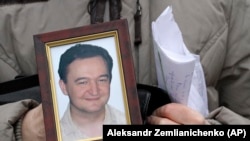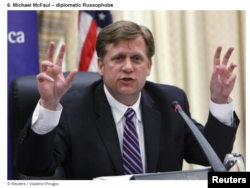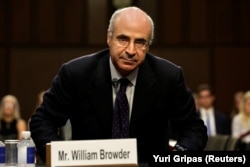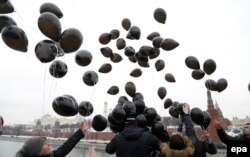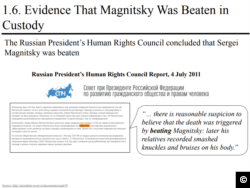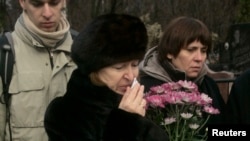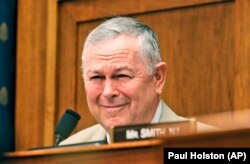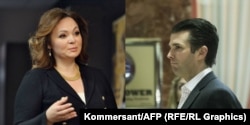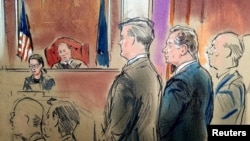On Tuesday, November, 6, Michael McFaul, an American academic and former U.S. ambassador to Russia from 2012 to 2014, tweeted “Victory! Hi VVP” in Russian. McFaul, a registered Democrat who served as President Barack Obama’s top Russia policy adviser before being appointed ambassador, was responding to preliminary election results, with his party having taken control of the House of Representatives for the first time in eight years.
VVP are the initials of Russian President Vladimir Vladimirovich Putin.
In a subsequent tweet regarding the outcome in the House, McFaul tweeted “yes” in Russian.
In a “US News” article with no byline, RT wrote that McFaul, whom the broadcaster included on its “Top 10 Russophobes of 2018” list and accused of “playing the drama queen,” is “apparently convinced that Putin would be upset with the results” of the U.S. congressional elections.
RT listed a number of issues -- from the U.S. withdrawal from the Intermediate-Range Nuclear Forces Treaty to sanctions against Russia for annexing the Crimean peninsula and allegedly employing a nerve agent in a botched attempt to assassinate a former Russian spy in Salisbury, England -- to argue it is difficult to believe Putin was saddened by the results of the U.S. vote given that, in RT’s words, “Trump has in many ways actually taken a tougher stance on Russia than his predecessor.”
RT then turned to Bill Browder, the CEO and co-founder of Hermitage Capital Management, who also made RT’s top ten list as a “not for profit” Russophobe.
RT said “investor shark” Browder had “rebranded himself as an anti-Putin human rights crusader” after being accused of financial crimes in Russia.
The article also found fault with a Browder tweet regarding Dana Rohrabacher, a member of the U.S. House of Representatives from California's 48th congressional district who lost his bid for re-election on November 6.
“Browder celebrated a victory in a ‘proxy war in Orange County’, because ‘Putin minion’ Dana Rohrabacher failed in his reelection bid there. It’s really convenient when you can declare, with impunity, that people you disagree with are minions.”
Several of the RT claims deserve our attention. First, both Browder and McFaul are wanted for questioning by the Russian Prosecutor General’s Office as part of a criminal case against Browder, Sputnik reported.
RT’s charge that McFaul is a “drama queen” stems from the fact that U.S. President Donald Trump appeared to consider a proposal from Russian President Vladimir Putin to allow Russian authorities to question McFaul in exchange for allowing U.S. investigators to question 12 Russian nationals indicted for meddling in the 2016 presidential election. The request came in a private meeting between the two presidents at the Helsinki Summit earlier this year.
McFaul tweeted that he considered that request “crazy.”
As Bloomberg News noted at the time: “Allowing the interrogation of a former American ambassador, who held diplomatic immunity while in Moscow, would be an unprecedented breach in protections traditionally provided to the nation’s foreign service.”
RT writes about McFaul often and even has a “trend” on its Website called “Michael McFaul news.”
Browder, born in the U.S. and now a British citizen, was once considered the largest investor in the Russian stock market and a supporter of Putin. He was first blacklisted from Russia in 2005, for being an alleged “threat to national security.” His fund, Hermitage, subsequently closed its Moscow operations. Browder would later charge that a cabal of corrupt Russian officials, using materials seized during police raids, took possession of three Hermitage companies in Russia, after which the officials fraudulently claimed $230 million that Hermitage had paid in taxes. That tax refund, the largest in Russian history, was approved in under 24 hours and paid out the following day.
That investigation of those moves against Hermitage was spearheaded by Sergei Magnitsky, an auditor from the Moscow-based law firm Firestone Duncan. Hermitage would go on to file 35 complaints against those implicated in the fraud case.
But in January 2008, Magnitsky himself was arrested after arriving to provide evidence to the prosecutor overseeing that case.
Magnitsky would go on to spend 11 months in pre-trial detention, where he was beaten and denied medical care. He ultimately died on November 16, 2009. A 2011 report from Russia’s human rights council found there was reasonable suspicion that Magnitsky had been beaten to death.
Browder’s advocacy ultimately led to the Magnitsky Act, which targets Russian officials implicated in human rights and corruption cases. After extensive lobbying, that U.S. legislation was passed in June 2012.
Later Russia, for the first time ever, put a dead man on trial, finding Magnitsky and Browder guilty of tax evasion in July 2013. That case was organized by many of the officials that Magnitsky had exposed.
Amnesty international called the posthumous trial of Magnitsky “farcical” and “sinister.”
Russia subsequently sought Browder’s arrest on numerous charges. Browder told Rolling Stone magazine earlier this year that Russia’s continued campaign against him, including his arrest in Spain this past May at Russia’s request, showed the “Magnitsky Act is working and we’ve found the Achilles’ heel of the Putin regime.”
As Rolling Stone put it: “What is the point of stealing a fortune from the Russian people if you can’t buy homes in Miami or Manhattan and educate your kids at Ivy League schools all because of some lousy sanctions?”
But to say Browder became a human rights campaigner in response to being charged with financial crimes is false. The very instrument of his campaign is named after the man who died after exposing malfeasance on the part of Russian officialdom.
Additionally, the accusations against Browder of financial crimes came after he left Russia, not before as implied in the RT article.
As for Rohrabacher, the conflict between he and Browder is much deeper than simply a difference of opinion.
Rohrabacher has worked against the 2012 Magnitsky Act. As noted in a complaint filed by Hermitage Capital, on May 18, 2016, when the Global Magnitsky Bill (an international version of the Magnitsky Act) was under consideration by the U.S. House Foreign Affairs Committee, Rohrabacher proposed “an amendment seeking the removal of Sergei Magnitsky’s name from the title of the Bill.”
In April 2016, Rohrabacher had traveled to Moscow, where he met with Russian lawyer Natalia Veselnitskaya to discuss the Magnitsky Act, an account she herself verified in an interview with a pro-Russian Crimean new service.
Veselnitskaya represented Prevezon, a Russian holding company accused by U.S. authorities of laundering money that was part of the funds embezzled from Hermitage. She also lobbied to get the Magnitsky Act repealed. Veselnitskaya worked with Glenn Simpson, a co-founder of Fusion GPS – the Washington, DC-based opposition research firm which, ironically, produced the unverified dossier detailing President Donald Trump’s alleged ties to Russia. Browder has charged that Fusion GPS was hired by Veselnitskaya and a U.S. law firm to conduct a “smear campaign” against him and Sergei Magnitsky.
On June 9, 2016, Veselnitskaya, met with Trump campaign officials at Trump Tower in New York, after promising incriminating information against Hillary Clinton. Donald Trump Jr. said she used that meeting to criticize the Magnitsky Act, the New York Times reported.
Veselnitskaya was quoted as saying that Trump Jr. said they could return to the issue of the Magnitsky Act if Trump won the election.
Also in April 2016, Rohrabacher met with Rinat Akhmetshin, a Russian-American U.S. lobbyist and former counter-intelligence officer tasked with overturning the Magnitsky Act, and Andrei Nekrasov, whose film “Magnitsky Act: Behind the Scenes,” has been viewed as an attempt to smear Browder and Magnitsky, and to undermine the eponymous act.
While U.S. House Foreign Affairs Committee chairman Ed Royce barred Rohrabacher from showing that film to Congress, Rohrabacher’s office promoted a screening of the film that took place at the Newseum in Washington, D.C., on June 13, 2016.
According to the New York Times, as early as 2012, the F.B.I. and senior members of the House Intelligence Committee warned Rohrabacher that Russian intelligence was attempting to recruit him.
Rohrabacher’s spokesman, Ken Grubbs, also confirmed that the congressman and an American delegation attended a breakfast in Saint Petersburg, Russia, on August 2015 with Alexander Torshin, an influential deputy governor of the Russian Central Bank.
That breakfast was organized by Maria Butina, who has been charged in the U.S. for acting as an unregistered Russian agent. Rohrabacher called Butina’s indictment “ridiculous and stupid,” adding: “This is an attempt to undermine the president’s ability to have better relationships with Russia.”
Rohrabacher has also called Paul Manafort, the former Trump campaign chairman, who recently pleaded guilty to conspiracy against the U.S. and conspiracy to obstruct justice, an “old friend”.
Following a March 2013 meeting involving Manafort and Rohrabacher, during which Manafort’s work in Ukraine was discussed, Rohrabacher admitted that Manafort gave him a “modest campaign contribution.”
The outgoing U.S. congressman also once famously tweeted that “if a majority of people legally residing in Alaska want to be part of Russia then its [sic] OK with me.”
Rohrabacher has responded by saying his constituents do not care about his links to Russia.
"They are not concerned about Russia. They are concerned about the taxes on their home. They are concerned about illegal immigrants coming into their neighborhood and raping people,” he said.
So while Browder’s use of the phrase “Putin minion” might not be to everyone’s liking, Browder’s criticism of the outgoing representative goes beyond the question of Rohrbacher only being someone with whom “you disgree.”
In its totality, we find RT’s statement to be misleading, and portions of it to be flatly incorrect.




